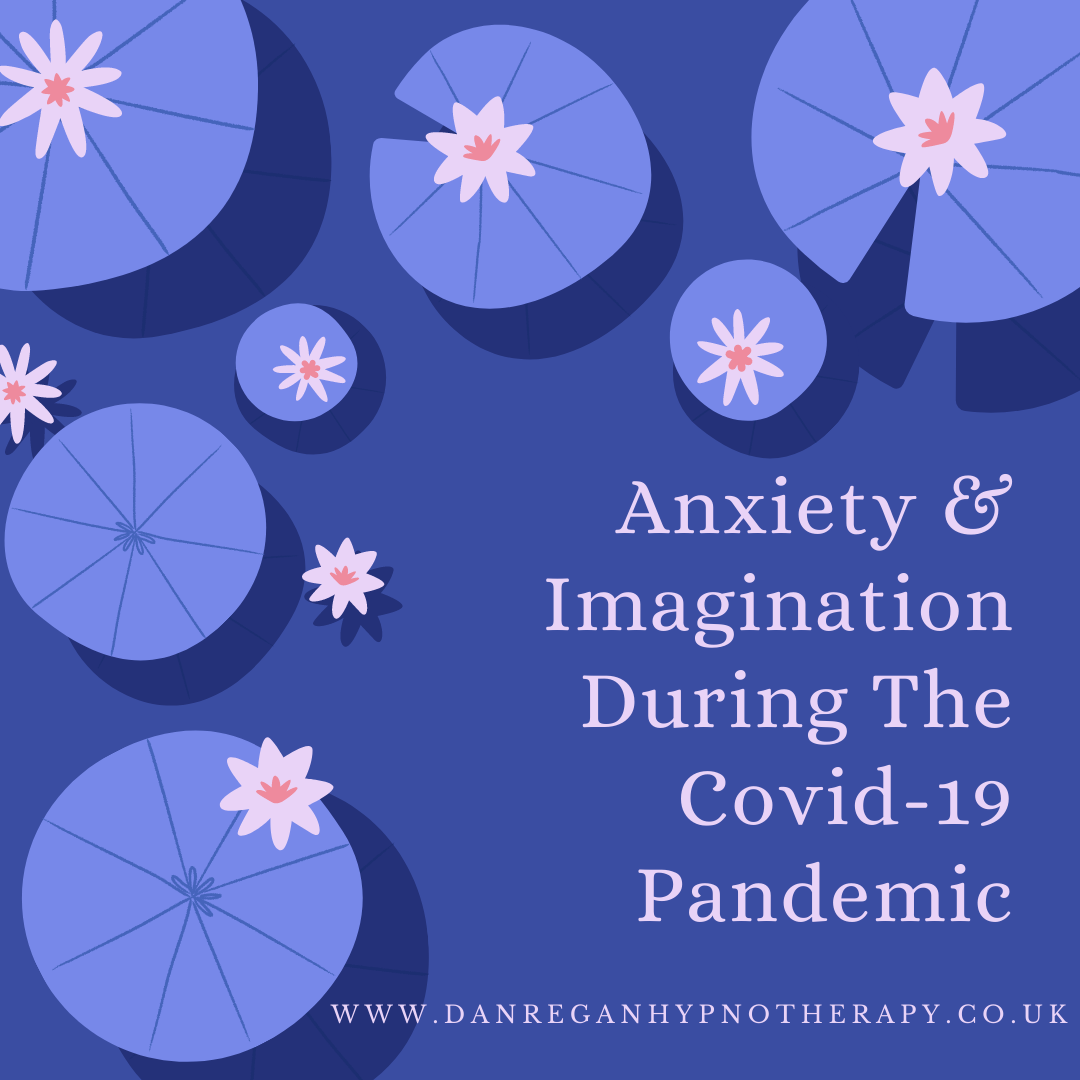Anxiety and Imagination During the Covid-19 Pandemic
There’s little doubt that the current Covid-19 pandemic, and everything that goes with it, has had a detrimental impact on mental health and well-being. I’ve covered before about the mass of studies and research that demonstrates this impact upon mental health.
You may have found yourself experiencing symptoms and feelings of anxiety, irritability, stress and even loneliness from being unable to see family and friends in ways you used to and would ideally wish to. As I write this (during lockdown three), positive tests and deaths are falling and the number of people getting the vaccine is accelerating, so let’s all hope that these green shoots continue.
And with it being Time To Talk Day this week, if you are struggling with anxiety or depression, or your mental health has been impacted in some other negative way, then please do talk to someone you trust. It is possible to get through what you are experiencing and there are those around you who want to listen, help and offer support.
Today I’m covering some research about the association between anxiety and your imagination.
Having a good imagination can be a positive thing; it can help with creativity, working things out, coming up with ideas and planning ahead. However, your imagination can have a ‘dark side’ that is linked with higher levels of anxiety, emotional distress, rumination and catastrophising. If you struggle with anxiety then these things may seem all too familiar in the cycle of anxiety, thinking the worst, dread and feeling you can’t cope with things.
So what does the research tell us about anxiety and your imagination during the Covid-19 pandemic, and how you can also use your imagination to effectively extinguish your anxiety?
Anxiety & Your Imagination During the Covid-19 Pandemic
If you struggle with anxiety then you’ll be familiar with how those emotions and feelings of dread are lined in your mind with imagined worst cases and negative outcomes, which only makes you feel worse, fuels your anxiety and leads to more thoughts. Those unwanted thoughts and feelings can lead to you avoiding things, trying to get out of things or suffering on uncomfortably (and sometimes overwhelmingly).
Whilst we often describe imagination as being one process, there are (according to a recent model), four distinct components: (1) frequency – the amount of time you spend imagining, (2) complexity – the detail with which you imagine, (3) emotional valence – the degree to which you imagine in a positive or negative manner, and (4) directedness – how goal-oriented (vs. “free-floating”) your imagination tends to be (Zabelina and Condon. The Four-Factor Imagination Scale (FFIS): A measure for assessing frequency, complexity, emotional valence, and directedness of imagination. 2019).
Applying these to anxiety, it’s common to find that an anxious person spends a great deal of time imagining the worst, particularly in quieter times or when not occupied by other things. These imagined scenarios and possibilities can often be vivid and detailed, and will certainly be in a negative direction. And you may find that there are goal directed type imaginings where you are dreading a particular thing, or that your mind seems to move from one anxious thought to another, perhaps like your mind never seems to switch off from the mental busyness.
Zabelina, Clay and Upshaw (The Association between Imagination and Anxiety in the Times of the COVID-19 Pandemic. 2021) examined the link between imagination, anxiety, and loneliness during the COVID-19 pandemic. They found that spending more time in your imagination was associated with elevated levels of anxiety. They also found that lonely people who spent more time imagining experienced the largest increases in anxiety during, compared to before, the pandemic.
“Results indicate that at least some features of imagination, particularly how much time people spend in imaginative states, may be associated with negative mood states, such as feelings of anxiety.”
These results showed that spending more time in your imagination was linked with higher levels of anxiety during the pandemic, and that lonely people who spend more time imagining are more likely to also experience the highest elevation of anxiety during the pandemic.
This highlights the need to learn how to take control over your imagination and thinking, so that you can spend less time inside your imagination to reduce anxiety (as well as being able to positively influence other components of your imagination). One of the things I teach the people I work with is how to limit your mind from going down those anxious imagined pathways, as well as being able to calm the anxious emotions that direct your thinking in that direction. By spending less time imagining in a negative, anxious way, the evidence shows you can reduce your anxiety.
In addition, if you are struggling with loneliness during this pandemic, please do reach out to others. Whether you make a call, send a text, arrange a socially distanced exercise walk, or even a zoom meeting, please aim to mitigate any feelings of loneliness over the next few weeks. There are people out there who would love to hear from you so don’t let anxious or depressive symptoms kid you into thinking otherwise.
As I discuss below, the science shows us that, whilst your imagination may have this ‘dark side’, it can also be used constructively and purposefully to extinguish fear and anxiety.
Hypnosis, Anxiety and Your Imagination
Your imagination is a wonderful thing. We’d all be a bit lost if we couldn’t recall things from the past inside our minds, or plan for the future.
Yet with anxiety, your imagination can exacerbate all of those anxious thoughts and feelings, leading to overthinking, dwelling, dread and worry. Your anxious feelings lead your imagination down the path of the worst possible thing happening or a whole series of bad outcomes that you feel you won’t be able to cope or deal with. One of the most important skills in overcoming anxiety is being able to reign in your imagination and anxious thoughts, to challenge, dispute, redirect and undermine them inside your own mind.
And research shows that, even though your imagination can exacerbate your anxiety, it can also be used to overcome your anxiety and fear.
Reddan, Wager and Schiller (Attenuating neural threat expression with imagination, 2018), found that “imagined and real extinction are equally effective in the reduction of threat-related neural patterns and physiological responses elicited upon re-exposure to real-world threatening cues.”
In more straightforward terms, one of the established ways of helping you to overcome anxiety, fear and panic is to have you go into situations and stay there until the feelings subside and are extinguished. You basically face your fear, stay there and experience the anxiety, remain there (without escaping or avoiding it) and then after some time your feelings will reduce (a form of behavioural systematic desensitisation).
Now this research demonstrated that the same anxiety reduction can be achieved by making deliberate use of your imagination. This is one of the bedrocks of effective hypnosis. You prepare and prime yourself to handle things calmly and confidently before then going off to face that thing with a sense of positive belief to go through it successfully.
By making effective use of your imagination, you can reduce your anxiety and fear and then succesfully extend this into real-life scenarios where you are faced with those kinds of threats, cues and triggers that used to cause you to feel anxious.
Hypnotherapy can be particularly effective at helping you to overcome your anxiety. It can help you to learn to take control over your thoughts and feelings, to face situations and circumstances with confidence and resilience and to overcome old unwanted patterns and habits of thoughts, feelings and behaviours. It can also help in situations where it may be more difficult to reconstruct triggers and it can help you without the intense, and sometimes overwhelming, feelings that come from just trying to endure the anxiety and push through it.
Letting your anxious thoughts and imagination continue unabated can simply strengthen your anxiety and increase the unpleasant feelings and emotions that come with it. In contrast, this research demonstrates that well directed use of your imagination (for example, through hypnosis) can change your responses and put you in control so that the old feelings are no longer experienced.
“We conclude that an internal simulation of a real-world experience can alter the way one responds to that situation in the future. Indeed, imagined exposures to threatening stimuli are effective in the reduction of learned threat responses and evoke a network of brain activation similar to real extinction.”
I previously wrote about anxiety and your imagination here: Anxiety & Your Imagination
And, as well as this research which scientifically supports the hypnosis approach to anxiety, we also have more evidence for the effectiveness of hypnosis in the treatment of anxiety.
Valentine et al (The efficacy of hypnosis as a treatment for anxiety: a meta-analysis. 2019), looked at the overall effectiveness of hypnosis as a treatment for anxiety, and found that, “hypnosis is a highly effective intervention for anxiety. Our results indicate the average participant treated with hypnosis achieved more anxiety reduction than about 79% of control participants at the end of active treatment and about 84% of controls at the longest follow-up“.
The evidence here demonstrated that hypnosis is a highly effective intervention for anxiety and shows just how valuable hypnotherapy can be as a treatment for anxiety.
There’s more on this here: The Effectiveness of Hypnotherapy as a Treatment For Anxiety
If you are struggling with anxiety right now, there are many things you can do to being to tackle it and feel better. A good place to start would be by focusing on the three main areas associated with your mental health that I covered in this article: The Three Pillars of Mental Health. There are also many other pages of advice, techniques, tips and strategies you can scroll through on this website.
And be sure to get your free copy of my hypnosis download that will help you: Rapid Relaxation Hypnosis Download (what have you got to lose, it’s free!). Using your imagination to constructively overcome anxiety also forms the basis of my popular Anxiety Relief hypnosis download too!
To your health and happiness,
Dan Regan
Online Skype and Zoom Hypnotherapy
Face-to-face hypnotherapy in Ely & Newmarket
Need some help with anxiety, stress, worry and fear? Book your Complimentary Hypnotherapy Strategy Session with Dan now: Appointments
Find out what other people have said after their hypnotherapy sessions with Dan: Hypnotherapy Testimonials
And check out these powerful hypnosis downloads that can start helping you right away with anxiety, confidence and more: Hypnosis Downloads
References:
Reddan, M.C., Wager, T.D. and Schiller, D., 2018. Attenuating neural threat expression with imagination. Neuron, 100(4), pp.994-1005.
Valentine, K.E., Milling, L.S., Clark, L.J. and Moriarty, C.L., 2019. The efficacy of hypnosis as a treatment for anxiety: a meta-analysis. International Journal of Clinical and Experimental Hypnosis, 67(3), pp.336-363.
Zabelina, D.L., Clay, J.Z. and Upshaw, J.D., 2021. The Association between Imagination and Anxiety in the Times of the COVID-19 Pandemic. Creativity Research Journal, pp.1-11.
Zabelina, D.L. and Condon, D.M., 2019. The Four-Factor Imagination Scale (FFIS): A measure for assessing frequency, complexity, emotional valence, and directedness of imagination. Psychological research, pp.1-13.





0 Comments